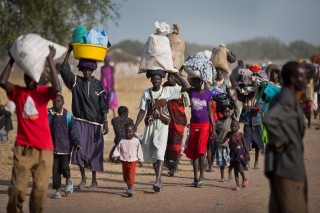South Sudan is one of the poorest countries in the world, its economy is one of the world’s weakest and most underdeveloped, with little existing infrastructure. Most villages in the country have no electricity or water with few paved roads. South Sudan is rich in agricultural land, however, agricultural production in the country has declined since Sudan started exporting oil in 1999. The average annual growth rate of the agricultural sector between 2000 and 2008 was just 3.6 percent, which is lower compared to the 10.8 percent growth rate of the previous decade, according to the World Bank. South Sudan relies on food imports from neighbouring countries, such as Uganda, Kenya, and Sudan. The declining agricultural production and the reliance on expensive foreign food supplies have contributed to a severe food shortage in South Sudan.
Three years after donors turned off the aid taps following the outbreak of war in the world’s youngest nation, South Sudan’s president Salva Kiir has received an offer of $105 billion (Shs378 trillion) for budget and project support from a Luxembourg-based investment fund. According to documents seen by The EastAfrican, a sister newspaper to Daily Monitor, this funding package, which could change South Sudan, from a failed state to a healing, politically viable and economically promising unit, was arranged at a meeting in Kampala on October 10, 2016, “between well-wishers for the peace and stability of South Sudan” and the Uganda agent of Suiss Finance Luxembourg AG.
According to the December 23 edition of the Indian Ocean Newsletter, Rene A Cortez, the director of Suiss Finance Luxembourg AG, wrote a letter on December 6, offering President Kiir’s government a “range of financial aid instruments.” Documents on the funding deal reveal that the instruments included safekeeping receipts, foreign exchange, and natural resources trading, as well as a line of credit, whose funds are to be deposited in South Sudan to be used as a direct support to the national budget.
Mr Cortez suggests that funds from his company could be used to finance projects through joint ventures in infrastructure, transportation, oil, and energy.
Suiss Finance was created in 2009 with a capital of €31,000 ($32,726) by lawyers Wolfram Otto Voegele, Katrin Dukic, and Kazimierz Walaszczyk.
“Suiss Finance Luxembourg AG offers the Republic of South Sudan initially €10 billion, which can be increased up to €100 billion. After duly executing the agreements and supporting instruments (signed by your minister of finance and endorsed by the Central Bank Governor), and with your co-operation, the 10 billion euros can be created and transferred into a Suiss Finance Luxembourg AG trust account to be held in the Central Bank of South Sudan between 30 and 90 days,” wrote Mr Cortez.
Mr Cortez suggests that funds from his company could be used to finance projects through joint ventures in infrastructure, transportation, oil, and energy. President Kiir is reported to have jumped at the opportunity as it offers a lifeline for his broke government. The country became the biggest source of refugees fleeing and leaving behind horrific levels of violence, rape, and kidnap.
If the deal goes through, it would signify a major breakthrough for the Juba government, and significantly thwart the efforts of the US, which in November 2016 pushed the UN Security Council to isolate South Sudan and consider a draft resolution on targeted sanctions against several leaders. Among those targeted is Sudan People’s Liberation Army Chief of Staff and President Kiir’s right-hand man Gen Paul Malong Awan.
But Corruption in South Sudan is among the worst in the world, the nation was ranked fifth on Transparency International’s 2014 list of most corrupt nations, preceded only by Somalia, North Korea, Sudan, and Afghanistan. The Africa Review noted in 2013 that despite the South Sudanese government having ordered several investigations into scandals, they are virtually always ignored or intentionally sabotaged altogether. President Salva Kiir Mayardit has repeatedly declared that his government is actively fighting corruption, but on April 12, 2013, he fired Elias Wako Nyamellel, Deputy Minister of Foreign Affairs and International Cooperation, “for acknowledging that South Sudan is corrupted and ‘rotten to the core.’ The problem is worsened by the lack of transparency in South Sudanese government records and business information.
South Sudan’s track record of corruption and embezzlement of funds raises questions about how transparent the government will be in managing the Suisse funds. Despite public statements about fighting corruption by Kiir, South Sudanese officials still continue to commit acts of corruption with impunity. Will the $105 billion offered by the Suiss Finance Luxembourg AG indeed be a lifeline to resuscitate South Sudan from a failed state or will it simply be business as usual?








